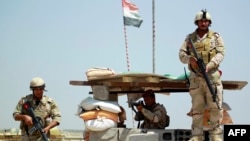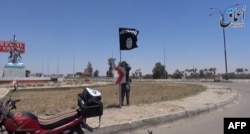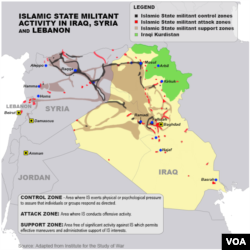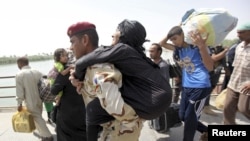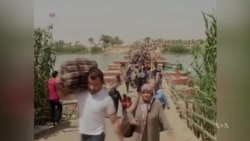U.S. Vice President Joe Biden telephoned Iraqi Prime Minister Haider al-Abadi Monday to thank Iraqi forces for their "enormous sacrifice and bravery" against Islamic State militants.
The call was apparently aimed at soothing Iraqi anger after U.S. Defense Secretary Ashton Carter said Sunday that Iraqi forces retreated from Ramadi last week because they "have no will to fight," allowing Islamic State to take over the city.
The White House says Biden reaffirmed full U.S. support for Iraq's fight against Islamic State, including plans to speed up training and equipping Iraqi forces. Biden also welcomed the mobilization of more troops as Iraq plans a counteroffensive to take back Ramadi.
Meanwhile, the White House Monday set out to clarify Secretary Carter's "lack of will" comment. A senior administration said it specifically referred to the fight over Ramadi, where Iraqi forces came under an intense wave of suicide bombings after spending 18 months holding off and weakening Islamic State.
The official also said the Iraqis admitted there were breakdowns in military command, planning, and reinforcement in Ramadi.
The official pointed out that Iraqi forces had suffered other setbacks before and were able to retake territory from the militants and are now starting to push back against Islamic State east of Ramadi.
IS boosts forces in Ramadi
The diplomatic crossfire comes as the Islamic State group is fortifying its ranks in the Iraqi city of Ramadi. Iraqi military and paramilitary forces are planning a counteroffensive to push back the frontline in Anbar province.
The U.S.-led coalition scaled back airstrikes on Ramadi overnight, focusing much of its 25 strikes in Iraq on the Islamic State stronghold of Mosul, and the town of Baghdadi. An additional 10 strikes targeted IS positions in Syria.
An Alhurra journalist in Iraq told VOA on Sunday that IS fighters have surrounded Baghdadi and Haditha, which are west of Ramadi on the highway toward Syria.
In an interview made public on Monday, Iraqi Prime Minister Haider al-Abadi told the BBC the city of Ramadi would be retaken from the Islamic State militants in the coming days, not weeks.
The Iraqi leader admitted the insurgent group overran military forces in a stunning retreat that prompted U.S. Secretary of Defense Ashton Carter on Sunday to question what he called the "will" of Iraq to defeat Islamic State.
But al-Abadi expressed confidence in his country's ability to push back the newest front line in the conflict.
"It will be within days, I can assure you," he said in the interview. Islamic State fighters "won this battle. It doesn't mean they're winning."
He also addressed security concerns for the capital, where Alhurra journalists told VOA security forces are on high alert after the advances of IS militants just 120 kilometers to the west.
Thousands flee
As tens of thousands of Ramadi refugees fled toward Baghdad, the government curbed the number allowed in, citing fears that militants could infiltrate the city and weaken it from within. Al-Abadi told the BBC that was the technique the Islamic State group used to seize Ramadi.
Secretary Carter, however, blamed the retreat of Iraqi forces.
"What apparently happened is the Iraqi forces just showed no will to fight. They were not outnumbered," Carter said on Sunday. "In fact, they vastly outnumbered the opposing force. That says to me, and I think to most of us, that we have an issue with the will of the Iraqis to fight ISIL and defend themselves."
National Security Advisor Susan Rice echoed Carter's concerns in an interview on CBS.
"Iraqi security forces face their own internal challenges... It's an uneven force in terms of will, equipment and leadership," Rice said, adding that the United States is working with them to address what she categorized as "weaknesses."
Shortly after the interviews aired, the head of the Iraqi parliament's defense and security committee, Hakim al-Zamili, told the Associated Press that Carter's comments are "unrealistic and baseless."
He said the United States is trying to shift blame to Iraq for Washington's failure to provide "good equipment, weapons and aerial support" to Iraqi forces.
Watch video report from VOA's Zlatica Hoke:




